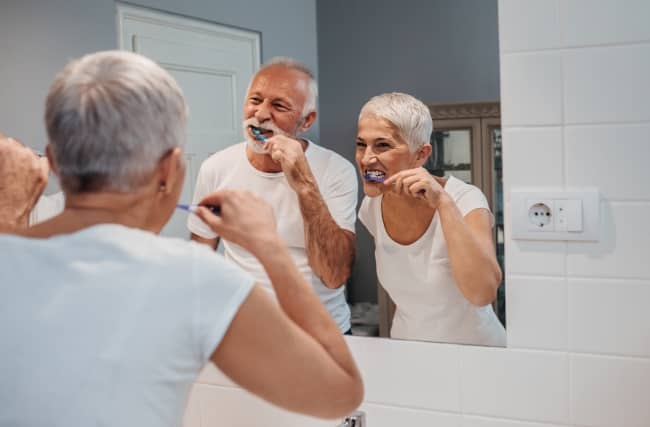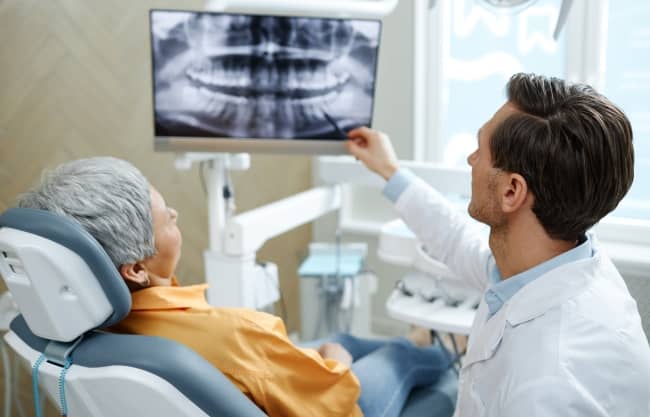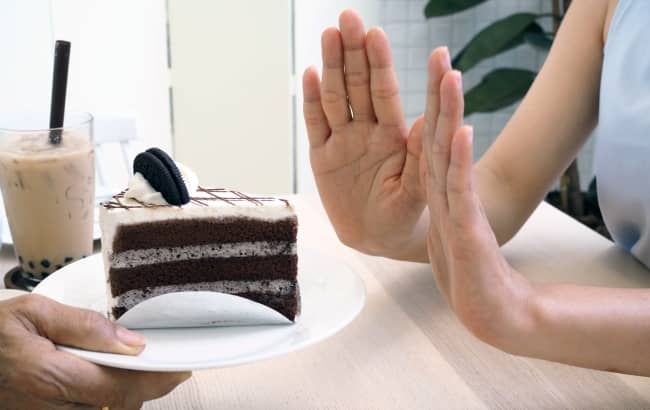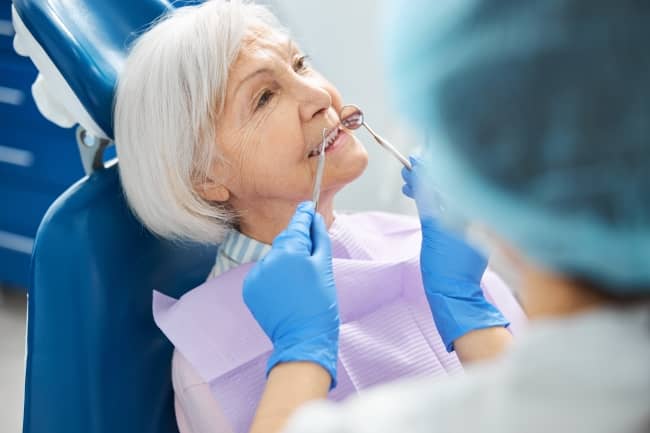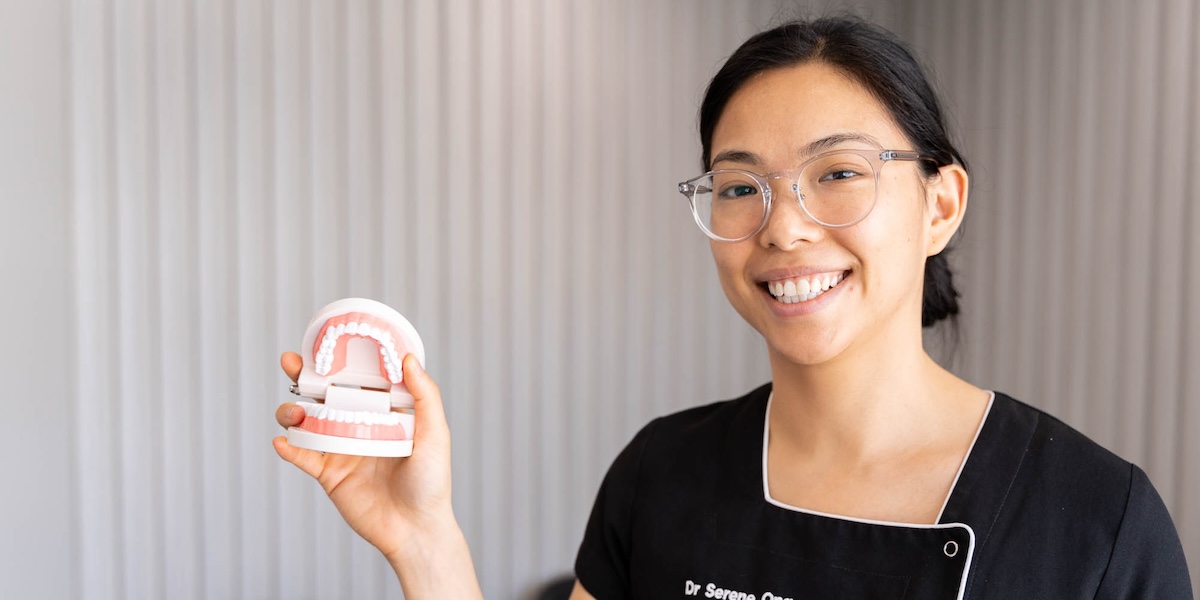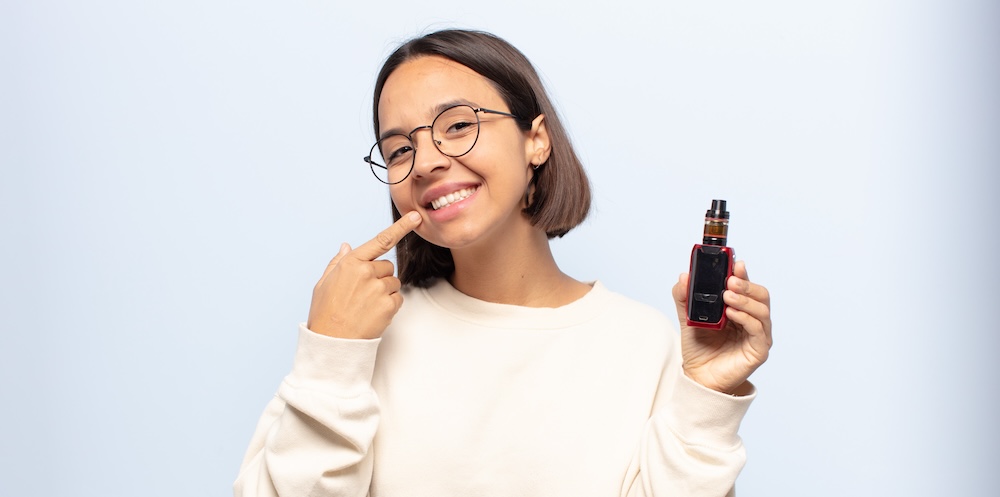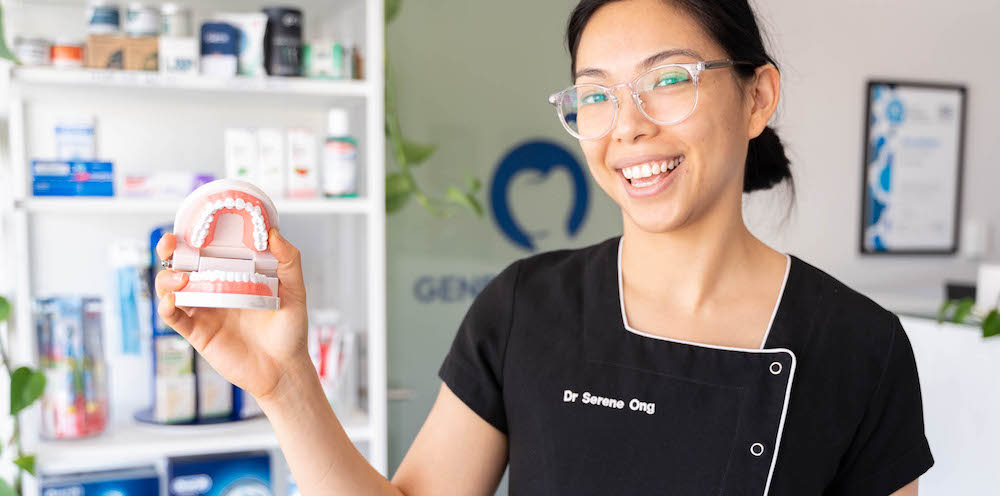
Oral Health and Aging: Is It Safe for Senior Adults to Go to the Dentist?
Oral health affects far more than just your teeth and gums. Along with a higher risk of decay, gum disease, and tooth loss, poor oral health is linked to certain health conditions, decreased well-being, and lower quality of life.
Unfortunately, senior adults face a higher risk of dental problems. Whether due to a lack of reliable transportation, cognitive or physical disabilities, or dental phobia, it can be a struggle for elderly individuals to get the dental care they deserve.
Here, we’ll look at common dental challenges senior adults face and how to safely and effectively provide dental care for seniors.
Is It Safe for Seniors to Go to the Dentist?
Yes, it is safe and beneficial for seniors to go to the dentist in most circumstances. However, it is best to consult your doctor if you are concerned.
Regular dental check-ups for senior adults play a significant role in their overall health and the aging process.
Loose or uncomfortable dentures, gum disease, decay, and missing teeth can lead to self-esteem struggles, social isolation, difficulty chewing and speaking, poor nutrition, and more.
Consistent dental checkups ensure any dental issues are caught early, allowing for the most straightforward treatment possible. Left unaddressed, minor dental issues can turn into serious conditions that require costly, more invasive treatment.
Senior adults should see a dentist at least once every six months for a check-up. More frequent visits may be required in certain situations, such as advanced gum disease.
Benefits of regular dental checkups for elderly patients
- Higher self-esteem
- More confidence during social interactions
- Improved ability to eat a wide range of foods and maintain a healthy diet
- Better sleep (discomfort from teeth grinding or other dental issues can have a negative impact on sleep)
- Increased vitality
- Better quality of life
- Support for overall health and wellness
- Early detection of health issues linked to poor oral health
- Monitoring of oral health in the presence of certain health conditions
- Detection of oral health issues such as bone loss, gum disease, dry mouth, receding gums, decay, and other problems that are commonly faced by senior adults
Common Dental Issues in Senior Adults
Tooth Decay and Cavities
Seniors are at an increased risk for tooth decay and cavities, especially individuals with dry mouth.
Left unaddressed, tooth decay and cavities can lead to tooth pain, gum disease, infection, and tooth loss. Preventative measures, such as daily brushing and flossing and attending regular dental checkups, are imperative for preventing tooth decay in seniors.
Gum Disease (Periodontitis)
Gum disease affects oral health and overall health. Gum disease has even been linked to an increase in heart disease.
Gum disease is a significant problem amongst the senior population. If it is allowed to progress, gum disease can lead to tooth loss, bleeding and sore gums, difficulty chewing, and problems with overall health.
Since gum disease can often be asymptomatic early on, regular dental checkups are one of the most important steps in preventing gum disease. Regular dental checkups for elderly individuals ensure that gum disease is caught and treated as early as possible.
Tooth Sensitivity
Tooth sensitivity in seniors can have a variety of causes, including gum disease, dry mouth, aggressive brushing, poor brushing habits, tooth decay, and teeth grinding.
Seniors with tooth sensitivity should talk to a dental professional about how to manage teeth sensitivity. A dentist may recommend a particular toothpaste or toothbrush, diet changes, ways to manage dry mouth, or provide education on proper brushing techniques.
Dry Mouth (Xerostomia)
A dry mouth is a condition where the mouth experiences reduced production of saliva. Saliva plays several important roles in supporting dental health, including protecting the teeth, rinsing away food debris, supporting a healthy mouth pH, and reducing bacteria in the mouth.
Many medications can worsen dry mouth. For elderly individuals, a dental professional can provide management for dry mouth and watch for any side effects of medications.
Tooth Loss
When gum disease or tooth decay goes unaddressed, it can lead to tooth loss. If an individual loses one or more teeth, it can lead to reduced self-confidence and an increase in other oral health issues such as tooth shifting, poor nutrition, and further decay.
Tooth loss is a common issue amongst elderly patients, making regular dental visits non-negotiable.
Addressing Dental Anxiety in Senior Adults
Dental anxiety in older adults can have a significant impact on their oral health. If you notice your elderly loved one is avoiding dental visits due to fear, it is crucial to address the issues and get them proper dental care.
A supportive dental team with experience in alleviating dental anxiety is critical to helping your loved one manage and overcome their dental fears.
An experienced dental team will be educated on strategies to manage dental fear and have the proper training for alleviating dental anxiety.
At Genesis Dental, we know how common dental anxiety can be. Along with our goal to provide the most comfortable, relaxing atmosphere possible, we also offer three types of sedation dentistry so your loved one never has to feel anxious about dental care again.
Read More: Tips on How to Overcome Dental Anxiety
The Role of Medications in Oral Health
Certain medications put older individuals at an increased risk of decay and dry mouth. Senior adults need to work closely with both their healthcare provider and dental professional to monitor any oral health side effects from medications.
Collaborating with healthcare providers helps mitigate oral health risks such as dry mouth. If needed, your health provider may be able to switch you to a different medication or your dental professional can educate you on steps for managing dry mouth.
Maintaining Proper Oral Hygiene as We Age
Good oral hygiene for senior adults involves many of the recommendations we suggest for younger patients, such as:
- Brush the teeth gently using a soft-bristled toothbrush and circular motions at least two times a day
- Use a fluoride toothpaste
- Attend regular dental checkups
- Floss at least once a day
- Schedule an appointment right away in the event of tooth pain, gum recession, excessive gum bleeding, swollen gums, denture issues, or chronic halitosis
- Consume a healthy, balanced diet featuring a variety of nutritious teeth-friendly foods
- Use a mouthwash if recommended by your dentist
- Ask your dentist for toothbrush recommendations for senior adults
- Ask for help from your dentist if you struggle with dexterity or mobility issues (your dentist can suggest helpful products or techniques for mobility challenges)
Denture Care and Considerations
Teeth that are missing or decaying can result in a lack of confidence, reduced ability to eat healthy foods, social isolation, and other negative effects.
Fortunately, dentures are an ideal solution for senior adults with advanced decay or missing teeth.
Benefits of properly fitted, comfortable dentures include:
- Increased comfort when chewing and the ability to consume a wider range of healthy foods
- Clearer speech
- Higher confidence and self-esteem, especially for social interactions (no need to worry about ill-fitting dentures falling out or trouble speaking clearly)
- Support for facial bone structure
- Possible decrease in oral health issues
It is important to care for dentures properly to keep them looking and feeling good by:
- Seeing your dentist for checkups at least once every six month
- Gently brushing your gums daily
- Avoiding the use of hot water on dentures as it can cause warping and damage
- Only using cleaning products specifically intended for dentures
- Avoiding the use of toothpaste, bleach, or other products to clean your dentures
- Soaking dentures regularly in a denture cleanser
- Brushing and cleaning dentures daily
- Storing dentures properly
- Handling dentures with care to prevent damage
- Notifying your dentist if you experience discomfort, difficulty chewing, or irritation (your dentist will see if your dentures need to be re-fitted)
- Evaluating the need for replacement for dentures that are over 5 years old
Read More: How to Tell the Difference Between Good Dentures and Bad Dentures
Nutrition and Its Impact on Oral Health
A nutritious diet plays a crucial role in influencing oral health in senior adults. Certain foods can help promote strong teeth and gums.
However, if an individual has ill-fitting dentures or has difficulty chewing, this can make it more difficult to consume a variety of healthy foods.
Care providers and dental professionals need to monitor an individual’s diet to ensure they are consuming a wide range of healthy foods.
Some of the healthiest foods for strong teeth and good oral health include:
- Foods high in vitamin D and calcium (cheese, yogurt, milk)
- Leafy greens (spinach, kale, etc.)
- Lean meat
- Fatty fish
- Nuts
- Seeds
- Kiwis
- Celery
- Carrots
- Apples
- Strawberries
- Blueberries
- Cranberries
- Raspberries
- Root vegetables
- Cucumbers
In addition to encouraging seniors to consume a wide range of healthy foods, paying attention to added sugar is also important.
Sugar is linked to a variety of oral health issues, making it imperative to read nutrition labels closely to watch out for the high amounts of added sugar that hide in so many foods. Even seemingly healthy foods like tomato sauce can be packed with extra sugar.
To cut back on your intake of added sugar, avoid or limit these foods:
- Cookies
- Candy
- Desserts and sweets
- Cake
- Pastries
- Bread
- Pasta sauce (read the label to find ‘no sugar added’ tomato sauces)
- Sugary beverages (soda, juice, etc.)
Read More: The Negative Effects of Sugar on Teeth
Emphasising Oral Health in Long-Term Care Facilities
Long-term care facilities can present a variety of challenges when it comes to ensuring proper oral hygiene for residents. Caregivers and long-term care settings need to find solutions that support proper oral hygiene for seniors.
For senior adults with dentures or individuals who take certain medications, additional assistance may be required to ensure proper oral hygiene.
Elderly individuals may struggle to maintain proper oral health due to medical conditions, cognitive issues, or lack of mobility. If an individual cannot brush or floss due to arthritis or other mobility issues, it is important to make sure they are receiving proper assistance in maintaining good oral health.
For some individuals, this may mean a staff member or loved one simply supervises their oral hygiene routine. Other individuals may require someone else to brush and floss for them.
If you are concerned about an elderly loved one’s oral health, talk to their dental provider about ensuring they get the help they need in caring for their teeth.
Your dental provider can help suggest tips for making their oral hygiene routine easier or more effective and can educate you on the best way to help them care for their teeth and gums.
Would You Like More Information on Oral Hygiene for Seniors?
Good oral health knows no age limit.
If you are concerned about dental challenges in senior adults, please contact our caring team. Since 2015, Genesis Dental has been providing high-quality family dentistry in Canning Vale for patients of all ages.
From babies getting their first tooth to senior patients, we help our patients achieve and enjoy good oral health through all stages of life.
Contact us today with any questions or to book an appointment.
